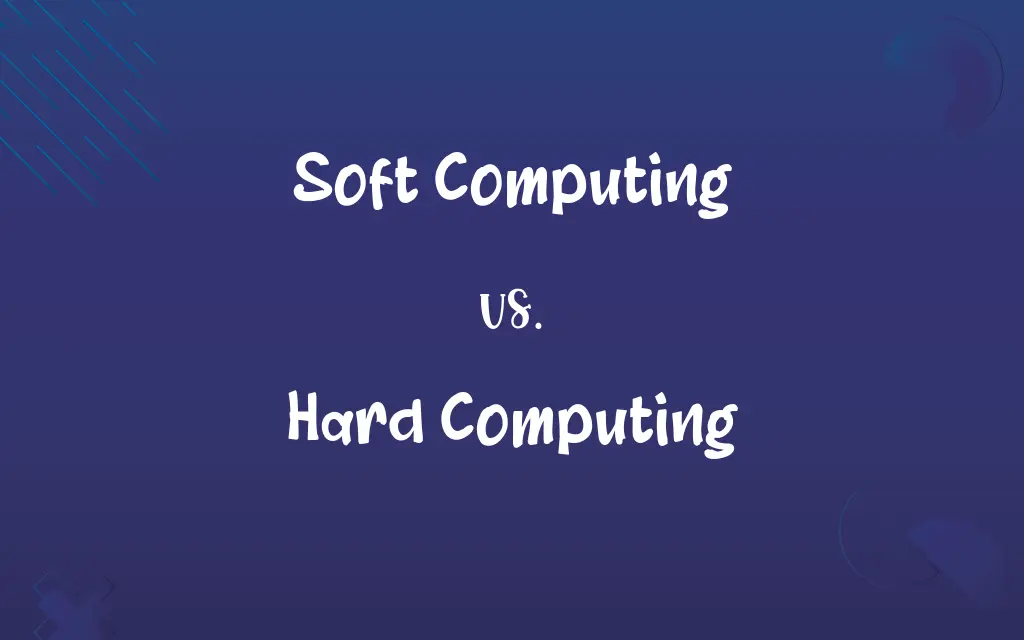Soft Computing vs. Hard Computing: Know the Difference

By Shumaila Saeed || Published on February 18, 2024
Soft Computing involves approximate solutions and tolerance for imprecision, while Hard Computing relies on precise algorithms and binary logic.

Key Differences
Soft Computing is characterized by its ability to produce approximate solutions, making it highly effective for complex, real-world problems where precision is often unattainable. Hard Computing, on the other hand, is based on binary logic, providing exact solutions and requiring precise inputs.
Shumaila Saeed
Feb 18, 2024
Soft Computing employs techniques like fuzzy logic, neural networks, and genetic algorithms, which mimic human-like decision making, embracing uncertainty and approximation. Hard Computing sticks to strict algorithms and clear, deterministic processes, valuing accuracy and exactitude over flexibility.
Shumaila Saeed
Feb 18, 2024
Soft Computing is often used in fields like artificial intelligence, where adaptive and heuristic approaches are necessary. Hard Computing finds its application in traditional computing tasks where rules are well-defined, and exact outputs are required.
Shumaila Saeed
Feb 18, 2024
The essence of Soft Computing lies in its tolerance for imprecision and uncertainty, making it suitable for complex, ambiguous problems. In contrast, Hard Computing demands precise input data and offers no room for ambiguity or inexactitude.
Shumaila Saeed
Feb 18, 2024
Soft Computing techniques can often provide faster, more efficient solutions for large, complex problems, at the cost of precision. Hard Computing, while precise, may require more computational resources for complex problems.
Shumaila Saeed
Feb 18, 2024
ADVERTISEMENT
Comparison Chart
Nature of Solutions
Approximate, often optimized for real-world scenarios
Precise and exact
Shumaila Saeed
Feb 18, 2024
Approach to Problem-Solving
Heuristic, human-like decision making
Algorithmic, rule-based decision making
Shumaila Saeed
Feb 18, 2024
Tolerance to Imprecision
High tolerance for imprecision and ambiguity
Requires precise, unambiguous input
Shumaila Saeed
Feb 18, 2024
Application Scope
AI, robotics, complex system modeling
Traditional computing, precise calculations
Shumaila Saeed
Feb 18, 2024
Computational Efficiency
More efficient for complex, ambiguous problems
More efficient for well-defined, exact tasks
Shumaila Saeed
Feb 18, 2024
ADVERTISEMENT
Soft Computing and Hard Computing Definitions
Soft Computing
Soft Computing incorporates flexibility and adaptability in computing.
Soft Computing is used in AI for adapting to new, unforeseen situations.
Shumaila Saeed
Jan 25, 2024
Hard Computing
Hard Computing does not tolerate ambiguity or imprecision.
Financial systems rely on Hard Computing for error-free transactions.
Shumaila Saeed
Jan 25, 2024
Soft Computing
It is based on techniques like fuzzy logic and neural networks.
Fuzzy logic, a Soft Computing technique, helps in decision-making in uncertain conditions.
Shumaila Saeed
Jan 25, 2024
Hard Computing
It is based on conventional computational models.
Hard Computing is essential in operations where error margins are intolerable.
Shumaila Saeed
Jan 25, 2024
Soft Computing
It is tolerant of imprecise and uncertain information.
Soft Computing techniques are used in weather forecasting, handling imprecision in data.
Shumaila Saeed
Jan 25, 2024
ADVERTISEMENT
Hard Computing
It demands exactitude in solutions and processes.
In mathematics software, Hard Computing ensures precise calculations.
Shumaila Saeed
Jan 25, 2024
Soft Computing
Soft Computing mimics human reasoning and decision-making.
Soft Computing algorithms help in predictive analysis by imitating human intuition.
Shumaila Saeed
Jan 25, 2024
Hard Computing
Hard Computing relies on precise algorithms and binary logic.
Traditional computer programs using Hard Computing require exact inputs.
Shumaila Saeed
Jan 25, 2024
Soft Computing
Soft Computing utilizes approximate solutions for complex problems.
In robotics, Soft Computing enables machines to learn from imprecise data.
Shumaila Saeed
Jan 25, 2024
Hard Computing
Hard Computing follows strict, deterministic procedures.
Database systems use Hard Computing for accurate data retrieval.
Shumaila Saeed
Jan 25, 2024
Repeatedly Asked Queries
What is Hard Computing?
It's a traditional computing approach relying on precise algorithms and exact solutions.
Shumaila Saeed
Feb 18, 2024
How does Soft Computing differ from Hard Computing in problem-solving?
Soft Computing uses heuristic, flexible approaches, while Hard Computing uses strict, rule-based methods.
Shumaila Saeed
Feb 18, 2024
What are some techniques used in Soft Computing?
Techniques include fuzzy logic, neural networks, and genetic algorithms.
Shumaila Saeed
Feb 18, 2024
Can Soft Computing handle ambiguous data?
Yes, it's well-suited for ambiguous and imprecise data.
Shumaila Saeed
Feb 18, 2024
Is Hard Computing suitable for complex, real-world problems?
It's less suitable compared to Soft Computing, as it requires precise data.
Shumaila Saeed
Feb 18, 2024
Can Soft Computing provide exact solutions?
It typically provides approximate solutions, not exact ones.
Shumaila Saeed
Feb 18, 2024
Can Soft Computing be used in robotics?
Yes, it's used for adaptive and flexible robot behaviors.
Shumaila Saeed
Feb 18, 2024
What are typical applications of Hard Computing?
Applications include traditional computing tasks like data processing and calculations.
Shumaila Saeed
Feb 18, 2024
What is Soft Computing?
It's a computing method that tolerates imprecision and approximations.
Shumaila Saeed
Feb 18, 2024
Does Hard Computing offer flexibility in decision-making?
No, it follows strict and deterministic processes.
Shumaila Saeed
Feb 18, 2024
Can Soft Computing handle real-time decision-making?
Yes, it's effective in scenarios requiring quick, approximate decisions.
Shumaila Saeed
Feb 18, 2024
Which is more efficient for large, complex problems?
Soft Computing is often more efficient in such scenarios.
Shumaila Saeed
Feb 18, 2024
How does Soft Computing mimic human decision-making?
By using flexible, heuristic approaches similar to human reasoning.
Shumaila Saeed
Feb 18, 2024
Is Hard Computing suitable for predictive analysis?
Only if the predictive model is based on precise, well-defined data.
Shumaila Saeed
Feb 18, 2024
Is Soft Computing used in artificial intelligence?
Yes, it's widely used in AI for its adaptive and heuristic nature.
Shumaila Saeed
Feb 18, 2024
Is Hard Computing error-prone in uncertain conditions?
It can be, as it requires precise and unambiguous information.
Shumaila Saeed
Feb 18, 2024
What role does binary logic play in Hard Computing?
It's fundamental, as Hard Computing relies on clear binary choices.
Shumaila Saeed
Feb 18, 2024
How does Soft Computing contribute to AI’s adaptability?
By allowing AI systems to learn and adapt from imprecise data.
Shumaila Saeed
Feb 18, 2024
Why is Hard Computing preferred in financial systems?
For its ability to deliver precise and error-free computations.
Shumaila Saeed
Feb 18, 2024
Is Hard Computing faster than Soft Computing?
It can be faster for well-defined, exact tasks.
Shumaila Saeed
Feb 18, 2024
Share this page
Link for your blog / website
HTML
Link to share via messenger
About Author
Written by
Shumaila SaeedShumaila Saeed, an expert content creator with 6 years of experience, specializes in distilling complex topics into easily digestible comparisons, shining a light on the nuances that both inform and educate readers with clarity and accuracy.







































































